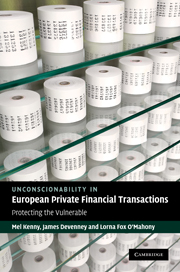Book contents
- Frontmatter
- Contents
- List of contributors
- Introduction: conceptualising unconscionability in Europe
- PART I Conceptualising unconscionability
- PART II Conceptualising unconscionability in financial transactions
- 8 Usury and the judicial regulation of financial transactions in seventeenth- and eighteenth-century England
- 9 Protection of the vulnerable in financial transactions – what the common law vitiating factors can do for you
- 10 Borrowers as consumers: new notions of unconscionability for domestic borrowers
- 11 Conceptualising and understanding fairness: lessons from and for financial services
- 12 Open the box: an exploration of the Financial Services Authority's model of fairness in consumer financial transactions
- 13 Conceptualising unconscionability in the context of risky financial transactions: how to converge public and private law approaches?
- 14 Conceptualising unconscionability in the post-Soviet era: the Lithuanian case of legal transplants
- 15 Bank loan contracts in Polish law: the legal position of the borrower
- 16 Financial contracts and ‘junk title’ purchases: a matter of (in)correct information
- 17 Kickback payments under MiFID: substantive or procedural standard of unconscionability?
- 18 Unfairness under the Consumer Protection from Unfair Trading Regulations 2008
- Conclusions
- Index
- References
8 - Usury and the judicial regulation of financial transactions in seventeenth- and eighteenth-century England
from PART II - Conceptualising unconscionability in financial transactions
Published online by Cambridge University Press: 06 August 2010
- Frontmatter
- Contents
- List of contributors
- Introduction: conceptualising unconscionability in Europe
- PART I Conceptualising unconscionability
- PART II Conceptualising unconscionability in financial transactions
- 8 Usury and the judicial regulation of financial transactions in seventeenth- and eighteenth-century England
- 9 Protection of the vulnerable in financial transactions – what the common law vitiating factors can do for you
- 10 Borrowers as consumers: new notions of unconscionability for domestic borrowers
- 11 Conceptualising and understanding fairness: lessons from and for financial services
- 12 Open the box: an exploration of the Financial Services Authority's model of fairness in consumer financial transactions
- 13 Conceptualising unconscionability in the context of risky financial transactions: how to converge public and private law approaches?
- 14 Conceptualising unconscionability in the post-Soviet era: the Lithuanian case of legal transplants
- 15 Bank loan contracts in Polish law: the legal position of the borrower
- 16 Financial contracts and ‘junk title’ purchases: a matter of (in)correct information
- 17 Kickback payments under MiFID: substantive or procedural standard of unconscionability?
- 18 Unfairness under the Consumer Protection from Unfair Trading Regulations 2008
- Conclusions
- Index
- References
Summary
The true spirit of usury lies in taking an unjust and unreasonable advantage of their fellow creatures.
The extent to which similar principles applied to loan transactions which fell outside the ambit of the usury laws, under the guise of unconscionability and related doctrines, was a question of great importance from the late seventeenth century.
The usury laws: the changing face of statutory regulation
John Baxton described usury as ‘lending for gaine’, the ‘gaine’ meaning the additional sum paid to the lender above the amount of the loan. His definition pre-dated the seventeenth century. It was derived from the canon law applied by the ecclesiastical courts, which had largely policed these transactions in the Middle Ages. In canon law, usury, any usury, was totally prohibited. Money lending continued unabated but those who wanted to avoid the risk of religious sanction were required to go to the trouble of disguising the true nature of the transaction.
By the late sixteenth century the old consensus was starting to collapse. In Thomas Wilson's A Discourse Upon Usury, published in 1572, a preacher, a lawyer, a merchant and a doctor of civil law debate the merits of usury. In the eyes of the preacher, usurers were little better than common criminals:
I will wyshe some penall lawe of death be made against those usurers, as well as agaynste theeves or murtherers, because their offence hurtheth more universallye and toucheth a greater number.
- Type
- Chapter
- Information
- Unconscionability in European Private Financial TransactionsProtecting the Vulnerable, pp. 147 - 165Publisher: Cambridge University PressPrint publication year: 2010
References
- 1
- Cited by



